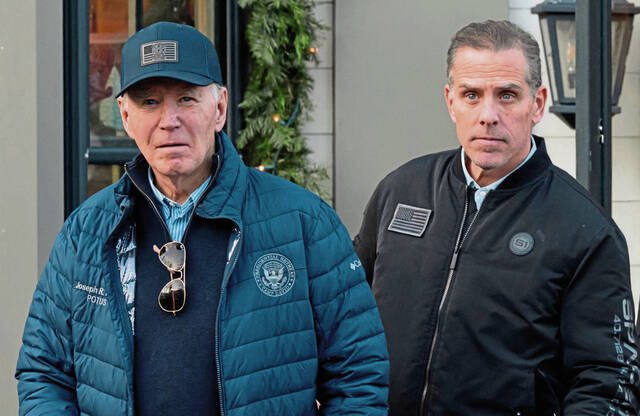https://development.triblive.com/opinion/lori-falce-pardon-me-do-you-have-any-clemency/
Lori Falce: Pardon me, do you have any clemency?

I beg your pardon.
It is a phrase you might hear as someone slips by you in an aisle at the store — unless you are in Minnesota, where it would be “Ope! Just gonna scoot past ya!” An “uff da” or “you betcha” might be thrown in for good measure.
It’s another version of excuse me. You aren’t really begging. You are barely asking. It’s a simple nod at politeness — words we barely think about as we move through the social contract of interacting with each other.
But, in the law, a pardon is a very particular thing, and asking for one often is a little like begging.
Pardons may be granted by a president or a governor. They are complete forgiveness — legally, at least — that takes an eraser to legal repercussions. It is a step up from commutation, an action that changes the penalty but allows the conviction to stand. Commutation generally shortens the sentence or modifies it, including staying a death penalty and turning it to life in prison. Both fall under the umbrella of clemency, the ability of the government to grant mercy.
It is one of the best-known powers of the presidency that does not require action by Congress and is not subject to an intervention by the Supreme Court. The president can forgive anyone of any federal crime — with one caveat.
“…He shall have Power to grant Reprieves and Pardons for Offences against the United States, except in Cases of Impeachment.”
And presidents have done just that. Of modern leaders, Franklin Delano Roosevelt, our longest serving executive, unsurprisingly pardoned the most with 3,687 and another 1,385 commuted. George H.W. Bush, with his one term, handed out just 74 pardons and only three commutations. Barack Obama awarded 212 pardons, which was just over half as many as Bill Clinton, but commuted the sentences of 1,715 people.
But let’s be honest. Right now, the only pardons anyone cares about are the ones by President Joe Biden — and those by once and future president Donald Trump.
Both have carried baggage. Trump pardoned a number of people close to his administration, his family or his campaign, including daughter Ivanka’s father-in-law, his pick for ambassador to France. His overall number was low — just 144 pardons and 94 commutations. He has suggested he will grant clemency in some fashion to those arrested after the Jan. 6, 2021, Capitol insurrection.
Biden pardoned 39 people and commuted about 1,500 sentences Thursday alone. He will be more known for the single pardon he announced Dec. 2 — that of his son Hunter. Biden previously pledged not to do so.
There are no limits on a president when it comes to who will receive that mercy. There are no checks. There is, however, a weight on the legacy that will follow. No one will ever forget Gerald Ford granted a pardon to Richard Nixon, something he couldn’t have done if that case became an impeachment.
U.S. Sen. John Fetterman, D-Pennsylvania, has suggested Trump’s hush money case should likewise be pardonable. There’s nothing in the rules that says it can’t be.
But presidents need to remember that just because you have a power doesn’t mean you have to use a power. It’s fine to keep that gun in the holster. Biden should remember that as he weighs proactive clemency before leaving office.
When it becomes so common, the pardon seems to lose its gravitas. It isn’t a formal, measured action taken after deliberation and petition.
It becomes someone just pushing a shopping cart down the aisle at the grocery store. Just gonna scoot right past ya and get to this pardon right here. You betcha!
Copyright ©2026— Trib Total Media, LLC (TribLIVE.com)
